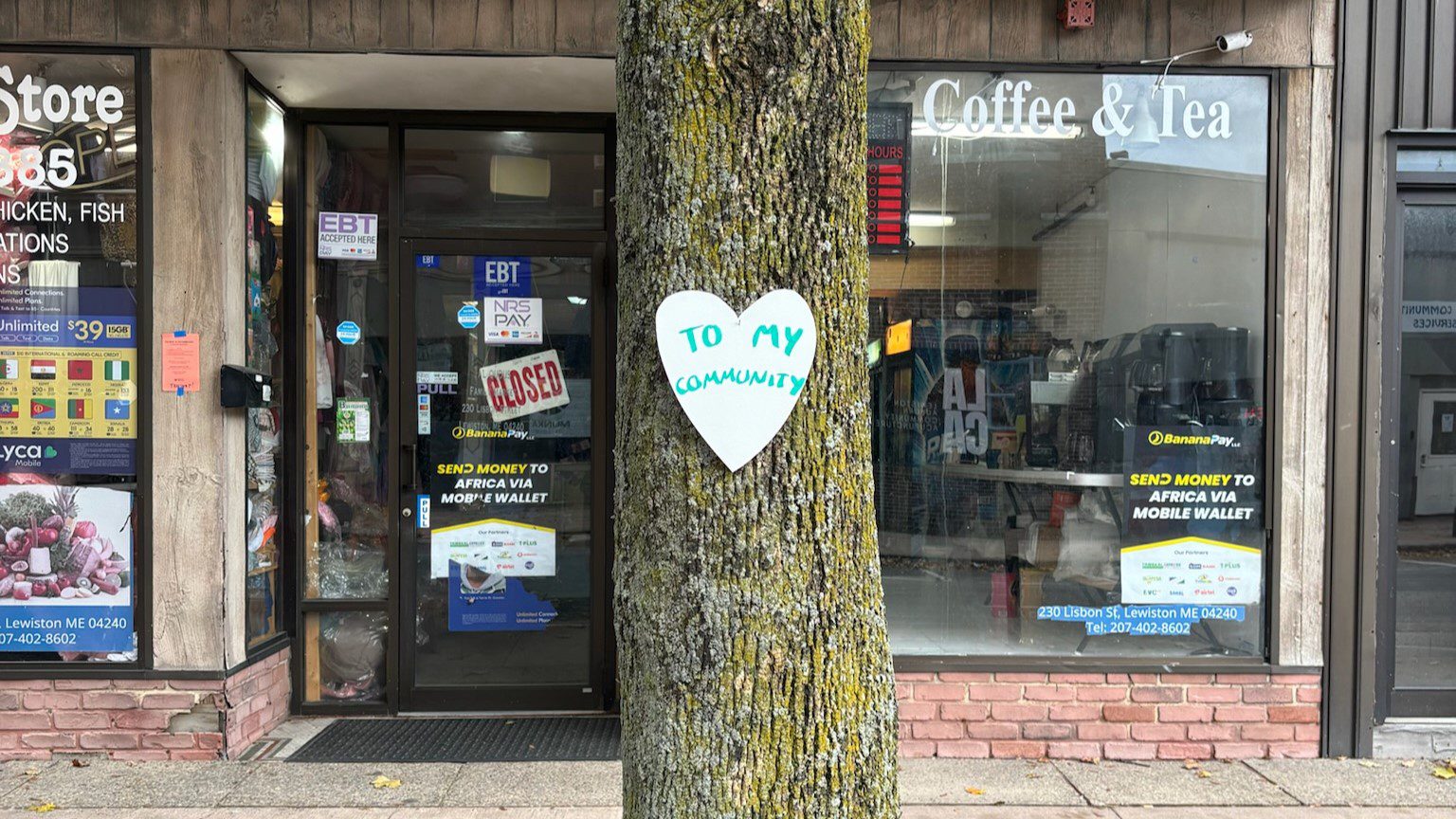With residents under a shelter-in-place order, the streets of Lewiston were mostly empty for much of Thursday, but for a heavy media presence and scores of local, state and federal officials gathered at City Hall in the morning.
In the wake of shootings that left at least 18 dead in Maine’s second largest city, local residents and officials expressed shock that the nation’s epidemic of mass shootings had come to their community and grappled to make sense of the past day’s events.
“It’s just so surreal. You don’t expect this in Lewiston, Maine. We’re in one of the safest states in the country,” Lewiston city councilor Bob McCarthy said in a phone interview Thursday.
“I feel for all the families that are involved. There’s a hole that’ll never be filled,” he said.
Gov. Janet Mills at a press conference Thursday morning confirmed that 18 people were killed in related shootings Wednesday night at Just-In-Time Recreation, a bowling alley at 24 Mollison Way, and Schemengees Bar at 551 Lincoln St. Thirteen people were injured.
It is the deadliest mass shooting event in Maine history and the deadliest so far this year in the U.S., according to a database maintained by the Associated Press and USA Today in partnership with Northeastern University and data from the nonprofit organization Gun Violence Archive.
“Lewiston is a special place. It’s a close knit community with a long history of hard work, of persistence, of faith, of opening its big heart to people everywhere,” Mills said at the press conference, her voice hoarse from working through the night.
It’s where she met and married her husband, and raised their children, she said.
“I’m so deeply sad,” Mills said.
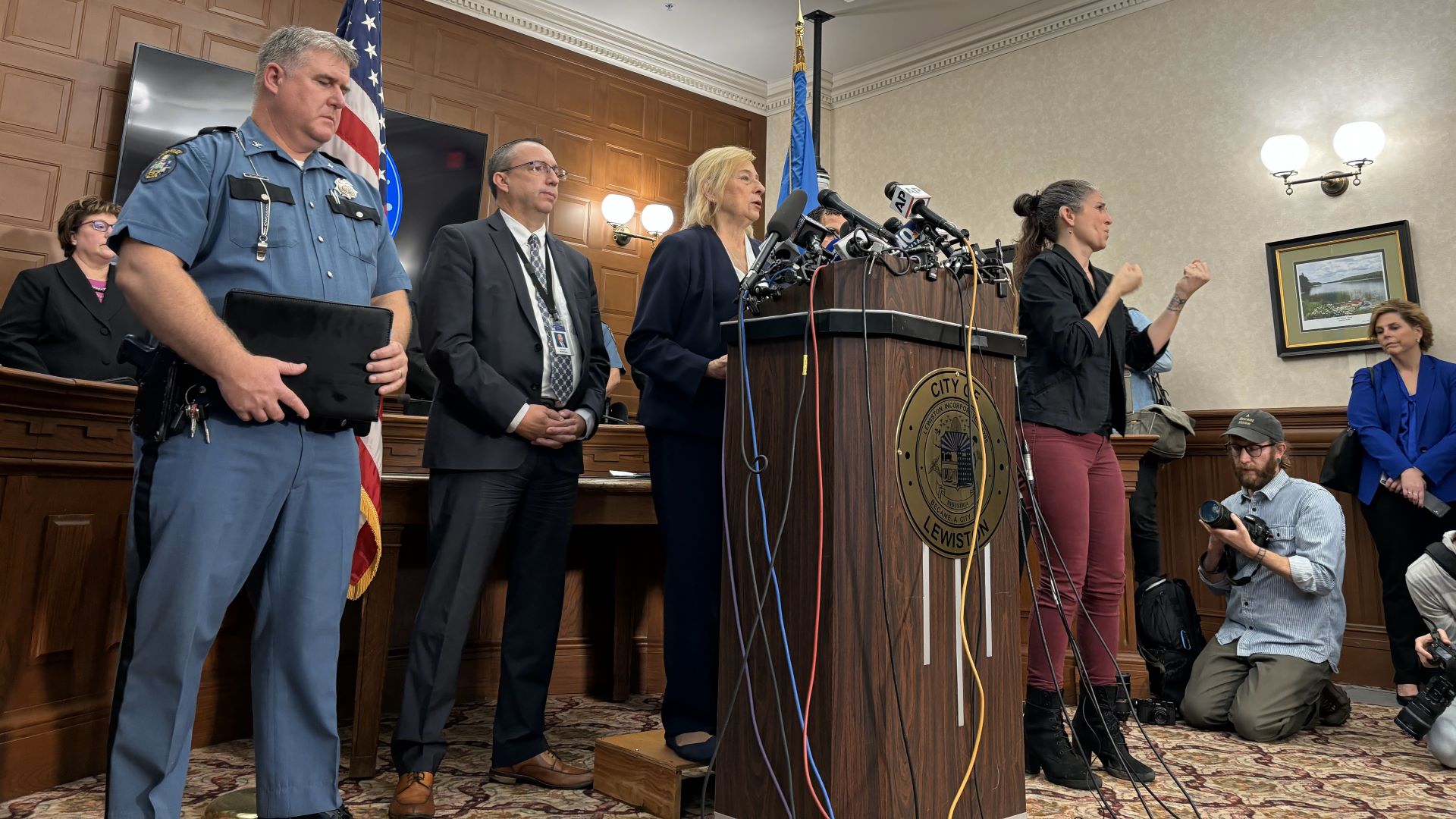
Later in the day, Miia Zellner, 22, and Hunter Kissam, 27, nailed paper hearts to trees along Lisbon Street. “To my community,” they read.
Massachusetts natives who now live in Lewiston, Kissam said they’re “very shocked.”
“(We’ve) been saying to others we’ve never felt safer than here and to see this happen to this community is baffling,” he said.
Just-in-time Recreation, the bowling alley where one of the shootings occurred, issued a statement on Facebook Thursday that expressed the shock that so many were experiencing.
“None of this seems real, but unfortunately it is,” the statement said. “We are devastated for our community and our staff. We lost some amazing and whole-hearted people from our bowling family and community last night.”
Similarly, the owner of Schemengees Bar and Grille, another shooting scene, said: “In a split second your world gets turn(ed) upside down for no good reason.”
A former mill town along the Androscoggin River in central Maine, Lewiston has long been a city of immigrants. In the mid-1800s, Lewiston’s population nearly doubled within a decade as French Canadians poured into the city to work in the textile mills, according to the Franco-American Collection at the University of Southern Maine. Lacking the funds to move back to their hometowns in Quebec and New Brunswick, many put down roots that remain strong to this day.
The Basilica of Saints Peter and Paul, a towering Gothic-style cathedral anchoring the city center, is the most striking example of Lewiston’s deep Franco American roots.
Nearly a century and a half later, a new wave of immigrants moved to Lewiston. Somali refugees, fleeing civil war, came in large numbers starting in the early 2000s. By many accounts, the new residents helped revive the city, which had long been in decline with textile mills gone. The city is also home to Bates College, a private liberal arts college.
Downtown Lewiston is home to four of the five poorest census tracts in the state. Nearly half of the residents living in the city’s Tree Streets neighborhood — the 30 blocks between Kennedy Park and the Colisée — live below the poverty line.
The city of 37,000’s often divisive politics play out in the city council. More recently, tensions have bubbled to the surface as the city struggles to find solutions to a housing crisis and revelations about decisions made by city leaders in both private and public about homeless shelters and affordable housing have come to light.
But on Thursday morning, those disagreements were the least of their concerns. Outside City Hall, councilors Linda Scott and Bob McCarthy embraced each other: “We put everything aside,” Scott told McCarthy.
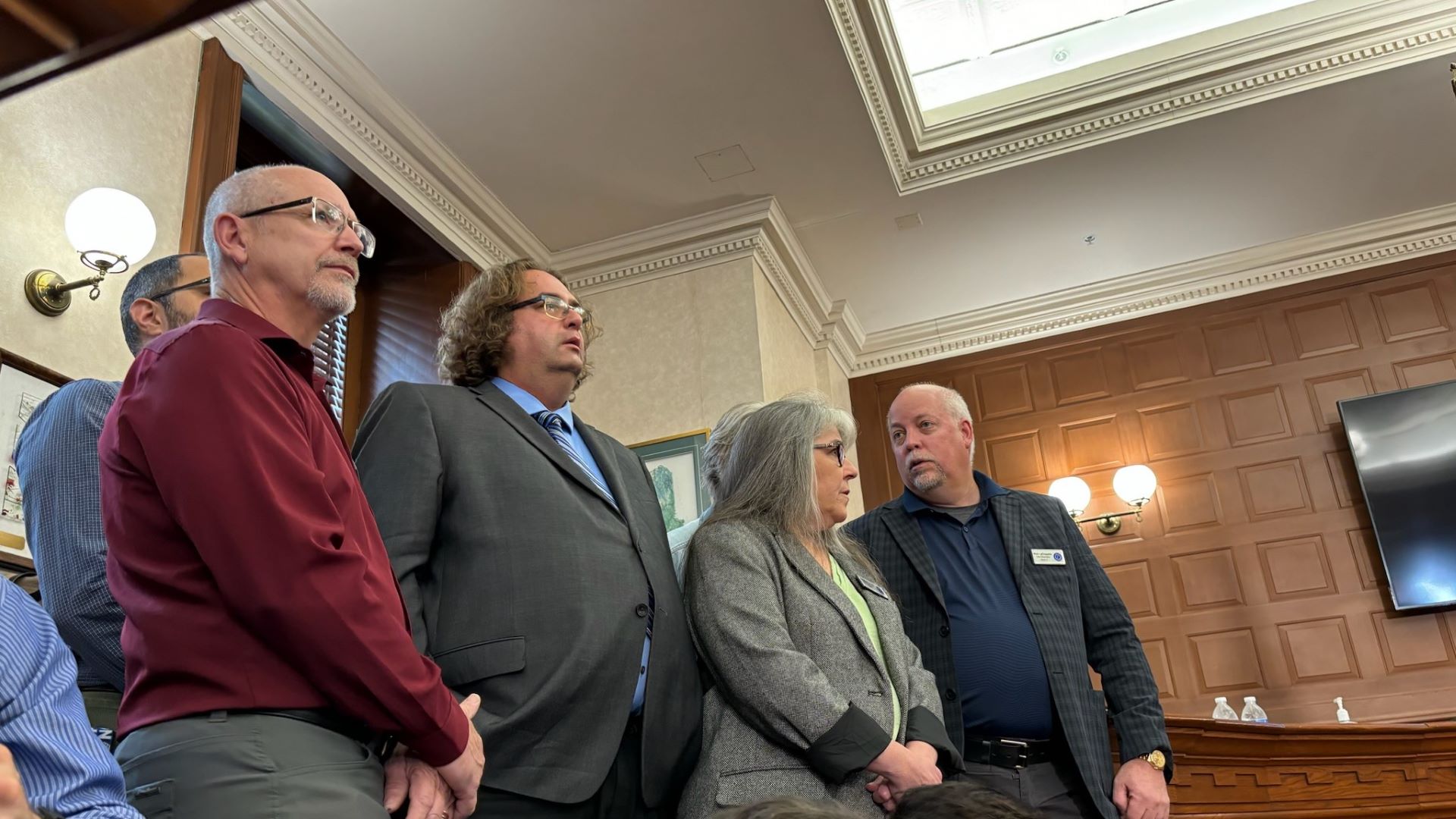
“The residents of Lewiston need each other right now and we need to support each other at this time,” Mayor Carl Sheline said after the press conference. “I urge everyone to check on their neighbors.”
McCarthy said much the same: “Just talk to your friends and family. Give them a call. If you’re feeling you need something, reach out.”
He added that there will be more community support, “but nothing can be done until this guy’s caught.”
As of Thursday afternoon, officials had not publicly disclosed the victims’ identities. Maine State Police Col. William Ross said at the morning press conference that authorities had identified eight individuals so far and were in the process of contacting next of kin.
A “person of interest,” Robert R. Card, 40, of Bowdoin, has been charged with eight counts of murder. As more victims are identified, the number of charges will likely go up, Ross said.
A massive manhunt that includes more than 350 law enforcement personnel from state and federal agencies is underway for Card, Maine Department of Public Safety spokesperson Shannon Moss said.
Shortly after midnight on Thursday, Auburn Mayor Jason Levesque told reporters gathered outside a makeshift reunification center at Auburn Middle School that at least 40-50 people were reunified with their worried loved ones.
“At this point, there is a significant amount of shock going on with people that were actually witnesses…” Levesque said. “Obviously when I was bringing people in that were looking for their loved ones, there is fear, there is panic, there’s worry. Understandable.”
“But the people that were actually there tonight, it was what I didn’t hear. It’s a shock. It’s hard for me to explain,” Levesque said. “I just want people to go home and hold their families.”
Taking a moment to steady himself, he said that not everyone who showed up at the middle school found their loved ones, but declined to say more.
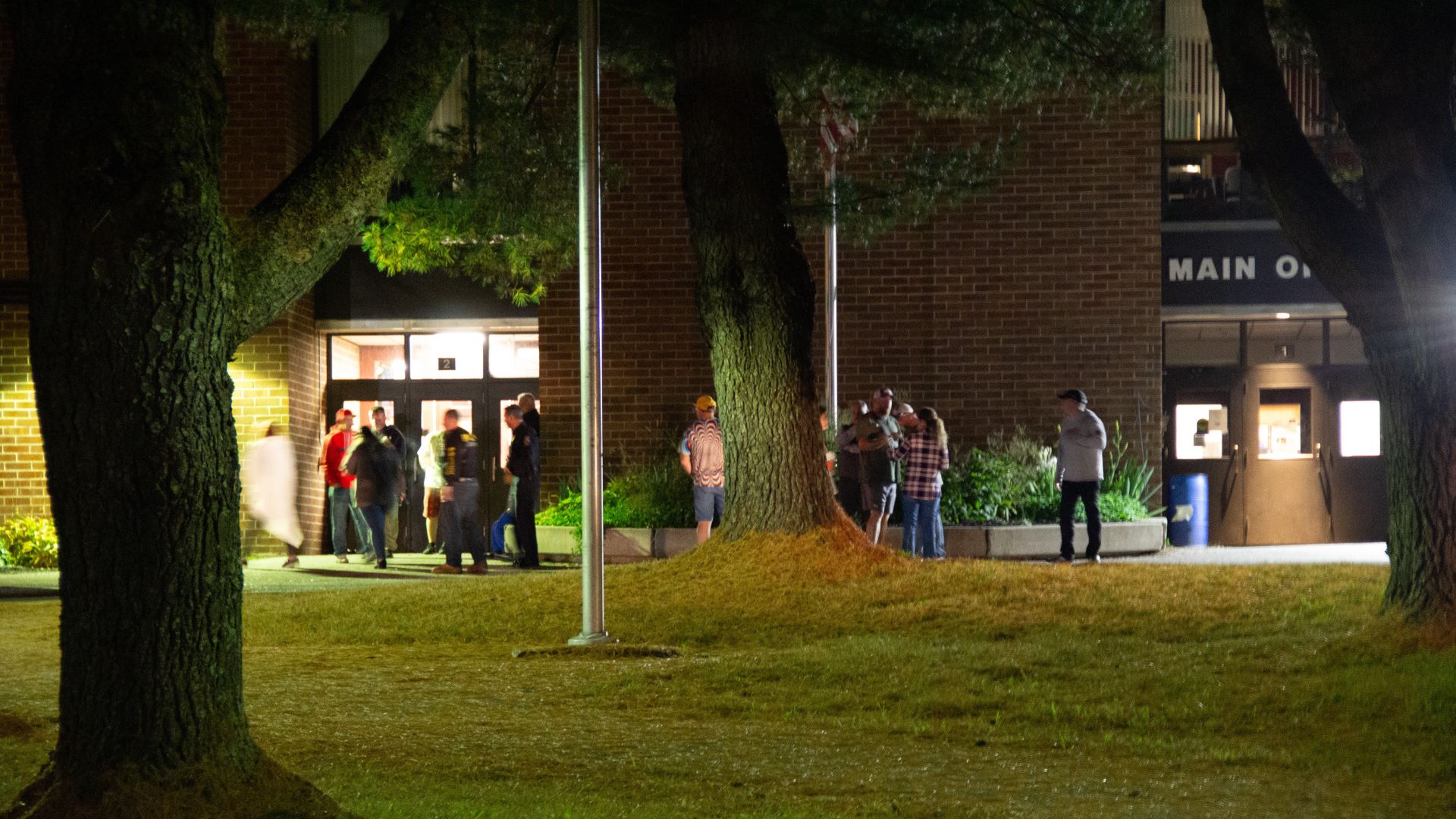
The massive response to the tragedy played out across the communities, including the Central Maine Medical Center.
When the first patient arrived at about 7:25 pm Wednesday, there were approximately 25 medical personnel ready and available, hospital officials later recounted. By the time the 14th patient came in about 45 minutes later, the team had ballooned to as many as 60.
“It has been a very challenging 16 hours,” said Dr. John Alexander, the Chief Medical Officer for the hospital’s parent company, Central Maine Healthcare.
By Thursday morning, dozens of reporters buzzed around outside of Lewiston City Hall ahead of a press conference. The sidewalk leading to the city offices was also dotted with law enforcement from municipal, state and federal agencies.
The streets surrounding the city’s downtown were otherwise sparsely populated and stores on Lisbon Street were closed as the city, other parts of Androscoggin and Sagadahoc counties remain under a shelter and place order from Maine State Police.
Lewiston resident Oscar Perkins, 62, was with a friend a few blocks away from Central Maine Medical Center on Wednesday night as emergency vehicles zipped across town with their sirens blaring and lights flashing.
“We [were] counting police cars and paramedic cars and lost count because there were so many of them,” Perkins said.
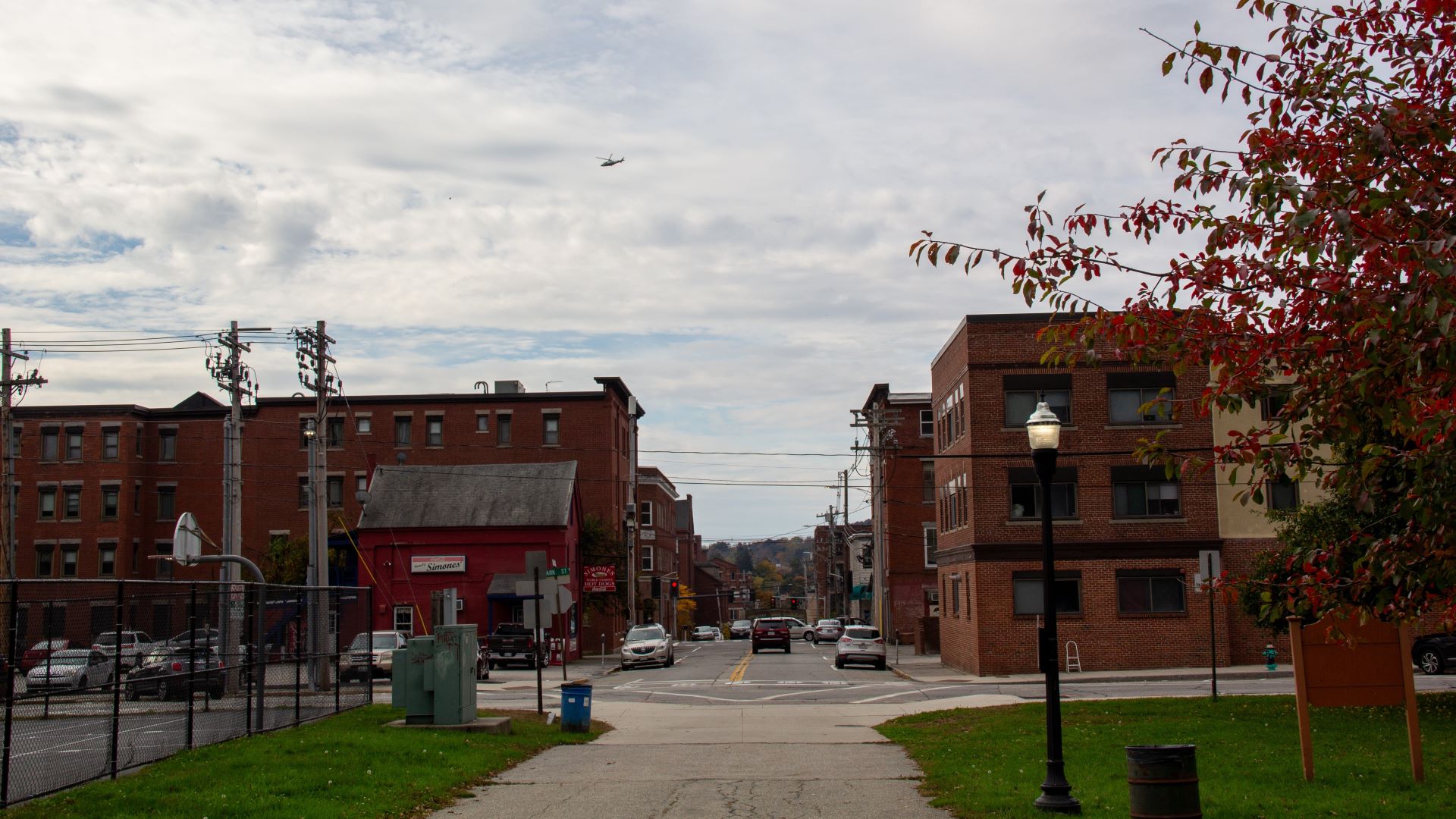
Perkins sat on a bench across from Kennedy Park on Thursday morning, watching as the commotion outside of city hall unraveled in front of him. He’s lived in Lewiston for over 30 years and said he has never seen anything like this happen before.
“Lewiston has never experienced that, and me neither. I’m from a big city, Cleveland, and nothing like this has ever happened,” Perkins said. “I know one thing: it will bring a lot of people together and scare a lot more people.”
“I’m just going to say, coming from a soon-to-be-mother, it’s really scary. Nothing like this should be going down,” Kassie Horton, 18, said. Her and her partner, Damien Horton, 20, live in an apartment building at the corner of Lisbon and Park streets.
The Hortons were sitting in front of the Lewiston Public Library Thursday afternoon with their friend, Damion Dobson, 30, who said he was walking along Strawberry Avenue a block away from Mollison Way Wednesday night when he heard sirens and saw fire trucks and ambulances rushing to the scene at the bowling alley.
Damien Horton was at work Wednesday night at ReEnergy on Alfred Plourde Parkway, across the street from the Walmart Distribution Center where initial reports said there was more gunfire. Officials later clarified that those reports were unsubstantiated.
Kassie Horton said she was sitting at home, hearing the sirens and calamity outside and thought, “What’s going to happen if he doesn’t come home?”


